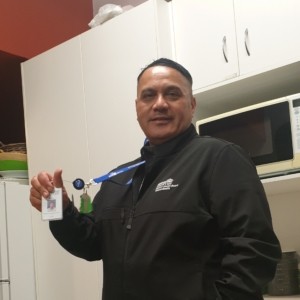
Anaru loves his new job at Te Wahanga Hauora Māori (The Māori Health Unit).
In the past year Anaru Hodges made a 180-degree career change. It all began when his niece started studying at EIT. Anaru took her under his wing to help her through the first months on campus. He was then approached by a staff member who encouraged Anaru to study as well. “I was working as sawmill operator at Pan Pac and never really considered tertiary education. However, I took a leap of faith and got out of my comfort zone,” says Anaru who is of Ngāti Pahauwera and Cook Island descent.
In December 2019 he enrolled into a Certificate in Health and Wellbeing with a Mental Health & Addiction Strand. Flash forward a year later, Anaru has a qualification in his pocket and a new full-time job as Kaitakawaenga Awhina (cultural adviser) with the DHB in Te Wahanga Hauora Māori (The Māori Health Unit).
Chris Malcolm, mental health lecturerat EIT, says that there is a massive demand for people like Anaru. Health providers are crying out for mental health professionals. “The Government is investing in greater access and choice of mental health services,” says Chris. “Recently the Minister of Health, David Clark, announced three new initiatives to train health practitioners and community workers to identify addiction and mental health needs and be able to respond to these.” Their aim is that over the next four years up to 12,000 more New Zealanders will receive mental health training.
For Anaru, months of juggling a full-time job and full-time study have paid off. “It was tough but my family helped me to go above and beyond.” Moreover, Anaru’s class started a whole external support network. “The mature students inputted their life experience, the younger ones supported us with their tech-savviness and energy. We met at my place once a fortnight to study together. Our graduation was a team effort.”
As part of the health and wellbeing certificate, students have to accumulate 200 hours of work experience. Anaru undertook his placement at Te Wahanga Hauora Māori (The Māori Health Unit) and was offered a full-time position. “My late father had been the first CEO for this organisation, so it’s great that I can pick up from where he left off.”
Anaru primarily works in hospital wards, floating between the mental health and other units. Thanks to his ethnic background he also liaises with the Pasifika team. “Our work is based on ‘te whare tapa whā’ model which are the four cornerstones of Māori health; physical, spiritual, family and mental health,“ Anaru explains.
Over the next five years the Ministry of Health will be rolling out an initiative to put trained mental health and addiction workers in doctors’ clinics, iwi health providers and other health services so that when people seek help it is immediately available.
Hawke’s Bay and Tairāwhiti will need 15 to 20 more peer health coaches, to assist people with recovery from substance use and mental health problems. “Many of these will be EIT graduates,” Chris highlights. “We also provide training for nurses, social workers and addiction workers to offer mental health and addiction assessments, referrals and advice to people when they visit their GP.”
Anaru will enrol in a diploma next year and then work towards a degree. “Seeing mental health problems through a cultural lens is desperately needed. My work is so fulfilling and I feel that I can make a real difference. I absolutely love my job.”
